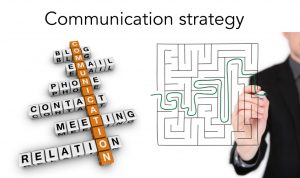
Did you know in Switzerland it’s typical for the birthday guy or gal to provide the party for their work colleagues or friends? That’s right, if you’re celebrating a birthday or anniversary, you provide the cake, drinks or other goodies. Since I’ve just moved back to Switzerland, I want to follow this custom for Aubia Communications’ second anniversary by providing my readers with great lessons I’ve learned from some masterminds. Be sure to read to the bottom for your gift!
I have a rule. I try not to meet celebrities. In my experience, most of the celebrities I’ve met turned out not to be anything like I imagined them. In fact, their entire personality and our meetings have completely destroyed the image I had built of them. Thank you, but I’d rather just keep my perfect persona of you in tact.
So, earlier this spring when I had the opportunity to not only meet but learn from two of my communications idols, it wasn’t without some trepidation. After following them on social media, being a regular reader of their blogs, and completely geeking out when I was retweeted by them, I decided to take the chance.
A gathering of masterminds
ShankMinds
 Earlier this year, I spent some time back in the United States waiting on my Swiss visa to come in. While I was visiting family in Georgia, Peter Shankman held one of his ShankMinds events in Atlanta. If you’ve never heard of Peter Shankman (and if you’re reading this blog, that’s pretty unlikely) or ShankMinds, you’re missing out on pure genius. It’s hard to say what Shankman is since he does so much, such as writes books, speaks at conferences, runs two consulting firms, and jumps out of airplanes. Let’s just say he’s a rockstar in the communications industry.
Earlier this year, I spent some time back in the United States waiting on my Swiss visa to come in. While I was visiting family in Georgia, Peter Shankman held one of his ShankMinds events in Atlanta. If you’ve never heard of Peter Shankman (and if you’re reading this blog, that’s pretty unlikely) or ShankMinds, you’re missing out on pure genius. It’s hard to say what Shankman is since he does so much, such as writes books, speaks at conferences, runs two consulting firms, and jumps out of airplanes. Let’s just say he’s a rockstar in the communications industry.
I drove three hours in the pre-dawn hours to attend ShankMinds Atlanta. Shankman holds these one-day events all over the country to bring entrepreneurs, small business owners and other professionals together to discuss and receive feedback on their biggest business issues. Consider it an epic brainstorming session. From all industries, you hear ideas and gain insights from an outside perspective you’ve never even thought of before. All the while, Shankman is floating from group to group, providing tips from his own experience, asking critical questions about your individual problem, and helping you peel back the layers to get to the heart of the matter. It’s intense executive coaching and exactly what I needed to rejuvenate aspects of my business.
In my own group, there were marketing, tech, and career counseling and networking experts. The top three lessons I took away from the day were:
1. Get in front of your niche audience
To grow your business, you need to target the demographic that your product best serves. Once you’ve done that, go after every opportunity to reach them. That could be delivering a talk to a professional organization or attending networking events. A member of our group was looking to reach tech support specialists, so an idea the group came up with was to create a podcast about the latest tech innovations and invite these people onto the show as guest interviewees.
2. Focus on solutions, not products
People don’t buy products; they buy solutions. Figure out what problems are facing your niche audience, and market the solution your product provides. Your product is only the segue into the sale, your solution is the end product. Instead of focusing your content on what products you offer, focus on how your products will help the consumer overcome his problem.
3. Work smarter, not harder
Many of our group members had discovered ways to systematize their businesses, from creating standard operating procedures for their virtual assistants to including direct purchases from their websites. By taking these measures on the front end, they were saving time and energy on the back end. The book Work the System by Sam Carpenter was recommended to learn more about this process.
I’m also very pleased to report that Shankman completely lived up to his online persona. The image I had of him from reading his blog posts and watching his videos transpired fully into the flesh-and-blood person. He even used the same phrases he writes with, and his authenticity was refreshing.
Integrate 2014
Another great opportunity presented itself while I was visiting family in Kentucky. Another three-hour drive away in Morgantown, W.Va., the West Virginia University Integrated Marketing Communications Master’s Degree Program was hosting its annual Integrate conference. For the price of attendance and caliber of speakers, this conference was the dynamic professional development opportunity.
 One speaker in particular, though, is what sold me. Gini Dietrich, CEO of Arment Dietrich , has been a professional idol for me since I was introduced to her Spin Sucks blog three years ago. Her candid style and outright defiant attitude toward preserving ethics in the PR field hooked me from the start, and I’ve been devouring her content ever since.
One speaker in particular, though, is what sold me. Gini Dietrich, CEO of Arment Dietrich , has been a professional idol for me since I was introduced to her Spin Sucks blog three years ago. Her candid style and outright defiant attitude toward preserving ethics in the PR field hooked me from the start, and I’ve been devouring her content ever since.
At the conference, she presented a talk entitled Spin Sucks – Communication and Reputation Management in the Digital Age. Just as in her blog, podcasts and other content marketing materials, she was frank and honest about the ethical state of PR today. The top three lessons I took away from her presentation were:
1. Sex sells, but only if you’re selling sex
When it comes to marketing campaigns, authentic will beat out shock every time. Dietrich gave a great case study on Miley Cyrus and her reinvention from Hannah Montana, explaining why her risque tactics worked where others have failed, such as Burger King’s Seven Incher ad. When using risque or shocking tactics, the end product has to resonate with the strategy. Sorry, but a cheeseburger doesn’t make anyone feel sexy.
2. Executives must be educated on PR ethics
Sometimes ethics in PR can be a murky gray. As the resident PR expert, it’s our job to educate our clients and leaders on what is right and wrong. We must take a stand against astroturfing, whisper campaigns and other media manipulations. Not sure if you’re facing an ethical dilemma? Check out the Public Relations Society of America’s Code of Ethics.
3. Communications is a marathon, not a sprint
For the integrated marketing field to achieve authentic, honest and ethical communications, it will take professionals consistently practicing these efforts over the long haul. You don’t receive paid, earned, owned and shared media over night, so keep working on these ideas day after day. Eventually, we will get there.
Once again, I’m happy to say Dietrich was everything I expected. She was sitting in the audience listening to another speaker when I first met her. She turned around and struck up a conversation with the group I was sitting with, and she couldn’t have been more gracious accepting our praise and fawning.
Bonus
There were a ton of innovated masterminds at Integrate 2014. Below is a brief recap of the presentations I attended with the main takeaways.
Igniting Communication Through Fan and Media Engagement
David Higdon, IMC managing director of NASCAR
After reorganizing the NASCAR communications department into an IMC structure over a three-year build out plan, David Higdon said the most important part was building the business case for how “IMC is a revenue-generating part of the business.” His six top mandates for IMC are:
1. Employ versatile talent
2. Fuel strategy from consumer insights
3. Integrate all departments in planning
4. Focus on objectives, measurement and results
5. Manage your reputation
6. Use qualitative, not just quantitative, measures for media engagement
There Is No Top 10 List for Social Media Marketing
Keith Quesenberry, Lecturer at The Center for Leadership Education at John Hopkins University
After reviewing thousands of Top 10 lists for social media, Keith Quesenberry takes it back to the basics. There are only three key steps to performing earnest social media marketing:
1. Identify your marketing goals and digital key performance indicators
2. Determine your target audience, where they’re talking online, and what they’re saying
3. Engage the target on their social platforms with meaningful branded content in a way that leverages each platforms key capabilities
Global Integrated Marketing Best Practices
Pam Didner, Global Integrated Marketing Manager
With years of experience at some of the world’s largest companies, Pam Didner has learned you must concentrate first on the business objective before setting the marketing objective. To do this, focus on:
1. The customer-driven experience where technology drives the marketing efforts
2. Simple ideas that can be creatively executed
3. Testing your idea to fail early and keep trying until you find the “nugget.”
Find Didner’s slides here.
 Digital Convergence: The Integrated Marketing and PR Imperative
Digital Convergence: The Integrated Marketing and PR Imperative
Lee Odden, CEO of TopRank Online Marketing
Combining marketing, PR, SEO and social media, Lee Odden says “content is the currency for building social relationships that can boost earned media.” To develop this content:
1. Discover where the consumers are and attract them on that platform.
2. Consume the information they are interested in and engage them with similar content.
3. Call them to an action and covert them to your solutions.
Find Oden’s slides here.
Thriving in Today’s Customer Driven World
Ellen Valentine, Evangelist at Silverpop
In today’s digital age, its easier than ever to customize consumers’ experiences. Ellen Valentine provides the formula Behavior + Data + Rules = Personal Experience. To navigate the relationship journey online:
1. Make it easy and desirable for the consumer to provide just their name and email address, you can ask more questions later
2. From there, provide a customized personal experience on the website
3. Implement rules-based communications through plug-ins for automatic generation
4. Drive relevancy to what the consumer is looking at
5. Move from a calendar to a concierge format, pull don’t push
6. Take big action to lead to the big picture
Failing Forward: The Value of Trial and Error in IMC Startups
Mike Kohler, co-founder of PGP Business Coaching and Consulting
Starting and managing a business is not for the faint of heart, and Mike Kohler offers some tried-and-true advice from his experience as a multiple entrepreneur:
1. Surround yourself with people who have skills you lack
2. Don’t go into business for yourself if you don’t have the stomach for sales
3. Get in front of your audience, not your colleagues
4. A marketing idea is not a marketing plan, and a marketing plan is not a business plan
A final mastermind gift for you
There’s a lot of nuggets there to take away, but I still have one final gift for you. I’ve created a strategic communications checklist that will run you through the four steps of research, planning, implementation and evaluation accompanied with tips and examples. [ddownload id=”1309″] now to create your own plan toward achieving your business goals. Need help? Contact me to get started.



